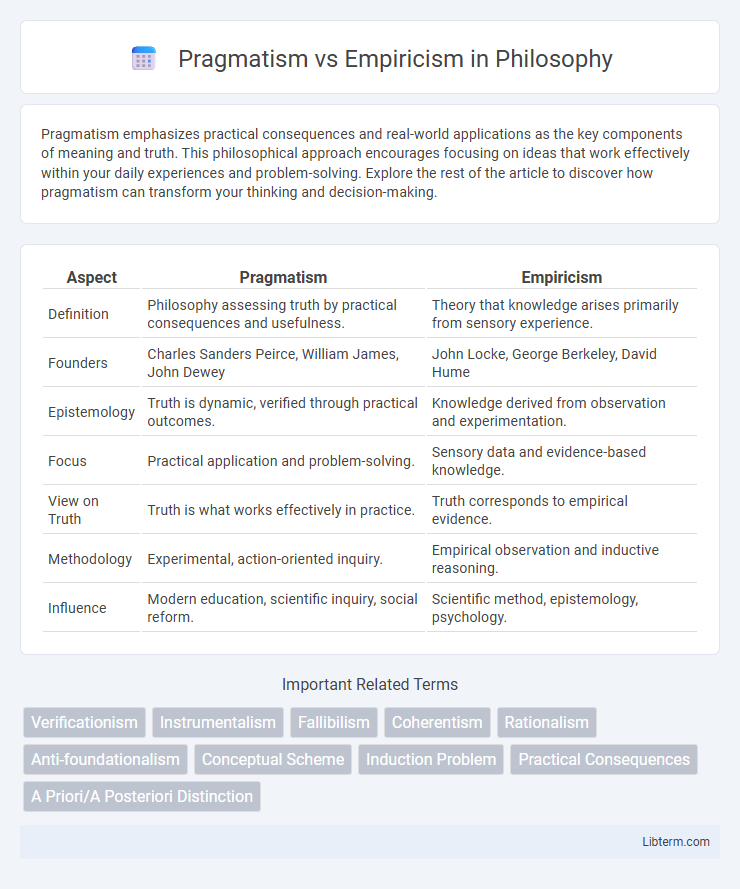Pragmatism emphasizes practical consequences and real-world applications as the key components of meaning and truth. This philosophical approach encourages focusing on ideas that work effectively within your daily experiences and problem-solving. Explore the rest of the article to discover how pragmatism can transform your thinking and decision-making.
Table of Comparison
| Aspect | Pragmatism | Empiricism |
|---|---|---|
| Definition | Philosophy assessing truth by practical consequences and usefulness. | Theory that knowledge arises primarily from sensory experience. |
| Founders | Charles Sanders Peirce, William James, John Dewey | John Locke, George Berkeley, David Hume |
| Epistemology | Truth is dynamic, verified through practical outcomes. | Knowledge derived from observation and experimentation. |
| Focus | Practical application and problem-solving. | Sensory data and evidence-based knowledge. |
| View on Truth | Truth is what works effectively in practice. | Truth corresponds to empirical evidence. |
| Methodology | Experimental, action-oriented inquiry. | Empirical observation and inductive reasoning. |
| Influence | Modern education, scientific inquiry, social reform. | Scientific method, epistemology, psychology. |
Introduction to Pragmatism and Empiricism
Pragmatism emphasizes practical consequences and real-world applications as the core criteria for truth, shaping knowledge through experience and action. Empiricism relies on sensory experience and observation as the foundation of all knowledge, stressing that understanding is derived from empirical evidence. Both philosophies prioritize experience but diverge in their approach to how knowledge is validated and applied.
Historical Context and Origins
Pragmatism emerged in the late 19th century United States, primarily through philosophers like Charles Sanders Peirce and William James, emphasizing practical consequences and applications of ideas. Empiricism traces back to early modern philosophers such as John Locke and David Hume, focusing on sensory experience as the foundation of knowledge. Both philosophies arose during periods of scientific advancement but diverged by prioritizing utility and action in pragmatism versus observation and experience in empiricism.
Key Philosophers and Their Contributions
John Dewey and Charles Sanders Peirce are central figures in pragmatism, emphasizing the practical application of ideas and the role of experience in shaping knowledge. Empiricism's foundations lie with philosophers like John Locke, who argued that knowledge derives from sensory experience, and David Hume, who stressed empirical evidence as the basis of human understanding. Both traditions contribute to epistemology by exploring the relationship between experience and knowledge, with pragmatism focusing on the usefulness of concepts and empiricism on sensory data as the source of all ideas.
Core Principles of Pragmatism
Pragmatism emphasizes the practical consequences and utility of beliefs as the core criterion for their truth, prioritizing action and results over abstract theory. It asserts that ideas must be tested through experience and their effectiveness in solving problems, integrating both thought and practice. Unlike empiricism, which focuses primarily on sensory experience as the source of knowledge, pragmatism evaluates the meaning and truth of concepts based on their successful application in real-world situations.
Fundamental Tenets of Empiricism
Empiricism centers on the fundamental tenet that knowledge arises primarily from sensory experience and observation, emphasizing empirical evidence over innate ideas or theoretical constructs. It asserts that all concepts and ideas are derived from sensory input, making experience the foundation of human understanding and scientific inquiry. This approach contrasts pragmatism by prioritizing verifiable data and experimentation as the basis for validating truth claims.
Comparing Methodologies: Pragmatic vs. Empirical Approaches
Pragmatism emphasizes the practical consequences and utility of ideas, prioritizing outcomes and real-world applications, while empiricism relies on sensory experience and observation as the foundation for knowledge. Pragmatic methodology encourages adaptability and iterative problem-solving based on results, contrasting with the empirical method's strict adherence to systematic data collection and hypothesis testing. Both methodologies value experience, but pragmatism integrates theoretical flexibility whereas empiricism demands rigorous evidence gathered through experience.
Role of Experience and Practicality in Knowledge
Pragmatism emphasizes knowledge as a tool shaped by practical consequences and real-world applications, valuing experience that leads to effective problem-solving. Empiricism asserts that knowledge derives primarily from sensory experience, prioritizing observation and experimentation as the foundation for understanding. Both philosophies highlight experience, but pragmatism stresses practical utility while empiricism focuses on empirical evidence as the basis of knowledge acquisition.
Applications in Science and Everyday Life
Pragmatism emphasizes practical outcomes and usefulness in applying scientific theories, guiding experiments based on results that work effectively in real-world scenarios. Empiricism relies on sensory experience and observation as the foundation for scientific knowledge, prioritizing data collection and evidence to shape conclusions. In everyday life, pragmatism aids decision-making by focusing on what works best in context, while empiricism encourages reliance on observable facts to validate beliefs and actions.
Criticisms and Limitations of Each Philosophy
Pragmatism faces criticism for its reliance on practical consequences as the primary measure of truth, which can lead to relativism and undermine objective knowledge. Empiricism is limited by its dependence on sensory experience, making it difficult to account for abstract concepts or knowledge beyond direct observation. Both philosophies struggle with addressing the complexities of theoretical knowledge, as pragmatism may dismiss ideas lacking immediate application, while empiricism often overlooks the role of innate cognitive structures in understanding reality.
Conclusion: Synthesis and Contemporary Relevance
Pragmatism and empiricism converge in emphasizing experience as the foundation of knowledge, with pragmatism focusing on practical consequences and empiricism on sensory data collection. This synthesis highlights how empirical evidence informs pragmatic decision-making, ensuring ideas are tested through real-world applicability. Contemporary relevance emerges in fields like scientific research and technology, where data-driven insights guide effective problem-solving and innovation.
Pragmatism Infographic

 libterm.com
libterm.com